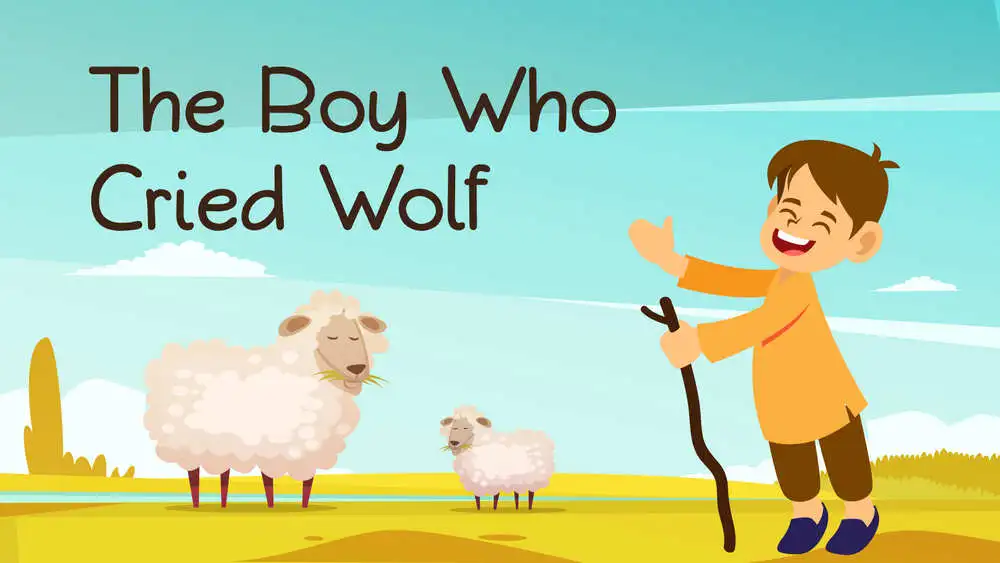Once upon a time, in a small village nestled in the hills, there lived a young boy named Peter. Peter was a shepherd, and his job was to watch over the village’s flock of sheep as they grazed in the fields.
One day, Peter grew bored of his duties and decided that he wanted to have some fun. He thought to himself, “I wonder what would happen if I cried out for help and pretended that a wolf was attacking my sheep?” The thought amused him, and so he decided to give it a try.

He waited until the other villagers were out of sight, and then he shouted at the top of his lungs, “Wolf! Wolf! Help!” The villagers heard his cries and came running to help him, but when they arrived at the field, they found no wolf, only Peter laughing at them.
The villagers were confused and annoyed, but Peter thought it was the funniest thing he had ever seen. He went back to tending to his flock of sheep, feeling pleased with himself for having played such a clever trick on the villagers.
The next day, Peter decided to try his prank again. He waited until the villagers were out of sight once more and then shouted, “Wolf! Wolf! Help!” Once again, the villagers came running to his aid, but once again, they found no wolf. This time, they were angry and scolded Peter for wasting their time and resources.

Peter felt a little bad about tricking the villagers, but he couldn’t resist the thrill of pulling off such a good prank. He decided that he would do it one more time, just for the fun of it.
So, the following day, he cried out once more, “Wolf! Wolf! Help!” The villagers, however, had grown tired of his tricks and decided not to come to his aid. They believed that Peter was only trying to play another prank on them, and so they ignored his cries for help.
Meanwhile, a real wolf had indeed entered the field and was attacking Peter’s flock of sheep. Peter cried out for help, but no one came to his aid. The wolf was able to kill many of the sheep before Peter was able to scare it off.
After the incident, Peter felt very ashamed of his behavior. He realized that his pranks had serious consequences, and that he should have been more responsible in his role as a shepherd. He went to the village elders and apologized for his behavior, promising that he would never play such a prank again.
The elders forgave Peter and praised him for his honesty. They also warned him of the importance of being truthful and responsible in his duties as a shepherd. From that day on, Peter was more diligent in his work and always made sure to tell the truth, no matter what.
The story of “The Boy Who Cried Wolf” has been passed down through the ages as a cautionary tale about the dangers of lying and the importance of being responsible. It teaches us that our actions can have serious consequences and that it is important to always be truthful and honest with others.
Moral of the Story
The moral of the story “The Boy Who Cried Wolf” is that lying and deceit have consequences. The story teaches us that when we tell lies, people may not believe us when we tell the truth, which can have serious consequences. It is important to be honest and truthful, especially in situations where others may be depending on us. Additionally, the story emphasizes the importance of taking responsibility for our actions and being diligent in our duties, as neglecting our responsibilities can lead to negative consequences.
The Boy Who Cried Wolf Summary
The story tells of a young boy who was tasked with watching over a flock of sheep in the hills. The boy was bored and wanted some excitement, so he decided to play a trick on the villagers by pretending that a wolf was attacking his flock of sheep. He shouted out, “Wolf! Wolf!” and the villagers came running to help him, but when they arrived they found no wolf, only the boy laughing at them.
The next day, the boy repeated his trick again and the villagers once again came running to help him. This time, they were angry and scolded the boy for wasting their time and resources.
Finally, on the third day, a real wolf actually did attack the boy’s flock. The boy cried out for help, but this time, no one came to his aid. The villagers thought that the boy was playing another trick, and so they ignored his cries for help.
As a result, the wolf was able to kill many of the sheep and the boy learned a valuable lesson about the importance of telling the truth and not playing pranks on others. The story teaches us that lying can have serious consequences and that it is important to be truthful and honest in our interactions with others.
Read More: The Monkey and the Crocodile Story








